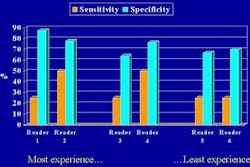Virtual colonoscopy got its first 15 minutes of fame on the first of December, when Navy radiologist Dr. Perry Pickhardt announced the results of his group's groundbreaking multicenter trial at the 2003 RSNA meeting. AuntMinnie members had gotten the news six weeks earlier.
Dear AuntMinnie Insider,
Virtual colonoscopy got its first 15 minutes of fame on the first of December, when Navy radiologist Dr. Perry Pickhardt announced the results of his group's groundbreaking multicenter trial at the 2003 RSNA meeting. The heartwarming holiday story, in which virtual colonoscopy overcomes modest beginnings to emerge (slightly) victorious over the conventional exam, played breathlessly and repeatedly on MSNBC, CNN, and in your local newspaper.
AuntMinnie members were able to sit back and enjoy the media spectacle, having read all about the study six weeks earlier in our exclusive report from the International Symposium on Virtual Colonoscopy in Boston.
But VC isn't resting on its laurels. Today's Insider marks the second time this fall that optical colonoscopy has come in second to its virtual counterpart (and, incidentally, the second time you're reading it here first).
In a new study from the University of Rome La Sapienza, Dr. Riccardo Iannaccone and colleagues compared virtual and conventional colonoscopy for staging 150 patients with known or suspected colorectal cancer, backing up the results with surgery and histology.
VC won. Conventional colonoscopy found the primary cancers all right, but obstructive lesions kept it from detecting 14 synchronous lesions that were subsequently picked up on virtual. VC also did a better job of assessing bowel-wall invasion, lymphadenopathy, and metastatic disease.
Of course, medicine is an art, not a horse race, and it's worth noting that conventional colonoscopy was still needed to go in and remove the incidental polyps. Moreover, the virtual test served up three false positives, and understaged 15 tumors including a T3 bowel-wall microinvasion.
But in light of its overall staging accuracy of 90.3%, Iannaccone's endorsement of virtual colonoscopy as a first-line test for patients with known or suspected colorectal cancer is a pretty safe bet. You'll find the rest of the story here.




















